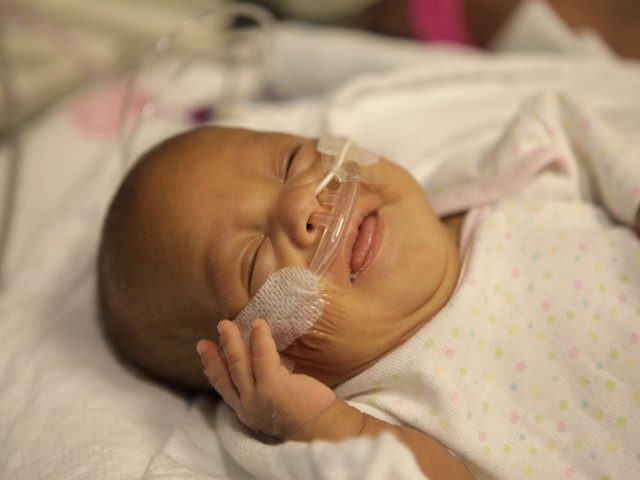Ohio Gov. Mike DeWine (R) signed a bill into law Wednesday that requires medical professionals to provide lifesaving treatment to an infant who survives an abortion.
Known as a “Born Alive” measure, SB 157 would also prohibit healthcare professionals whose salaries are dependent on taxpayer funding from working for or contracting with abortion facilities.
Thank you @GovMikeDeWine for signing the Born-Alive Infant Protection Act (SB 157) into law today! #prolife pic.twitter.com/NC8V7sWXHd
— Ohio Right to Life #EndAbortionOhio (@ohiolife) December 22, 2021
Abortion rights activists say the new law could result in the closing of abortion facilities in both Dayton and Cincinnati, since both have consulting agreements with local physicians affiliated with state hospitals.
The two abortion clinics were operating under a variance from another Ohio law that requires abortion providers to have transfer agreements with local hospitals in the event of a patient emergency. The new Ohio law would eliminate that variance.
Nilani Jawahar, legislative liaison for the Center for Christian Virtue (CCV), said:
Today the state of Ohio has made a bold statement about where our values lie—with women, children, and families—not with the abortion industry which demeans and exploits them. The Born Alive Infant Protection Act, with all its life-affirming provisions, is a declaration that Ohio will fight back wherever we can to keep our beautiful state from becoming a dark place where the weak and helpless are discarded to serve the interests of the powerful.
Chairman @Paduch applauds @GovMikeDeWine and Republican leadership for signing #BornAliveAct pic.twitter.com/Vh4wpWWa1p
— Ohio Republicans (@ohiogop) December 22, 2021
The pro-life Susan B. Anthony List sponsored a poll in February 2019 that found 77 percent of Americans support legislation that would ensure babies who survive abortion would be administered the same medical treatment as would any infant born prematurely at the same age.
That outcome included 75 percent of independent voters and 70 percent of Democrats.
President Donald Trump announced Wednesday during the National Catholic Prayer Breakfast he will be signing an executive order that ensures all babies born alive, including those surviving abortion, receive the medical care they need. https://t.co/1iSZKLDcMe
— Breitbart News (@BreitbartNews) September 24, 2020
Planned Parenthood referred in a statement to the new Ohio law as “a stigmatizing bill that sets out to create a law that already exists.”
Abortion rights activists frequently use talking points that claim a Born-Alive Act, at the federal level, is not “necessary” because Congress already passed the 2002 Born-Alive Infants Protection Act, or because infanticide is already illegal under homicide laws.
Patrina Mosley, Family Research Council’s director of Life, Culture, and Women’s Advocacy, addressed this issue in February 2020:
Congress did pass the 2002 Born-Alive Infants Protection Act, but that was only a definitional change stating that all infants who survive abortion are full persons under the law. It neither required any medical care for infants born-alive nor included a provision for prosecuting anyone who failed to provide care.
Mosley also referred to the murder conviction of Philadelphia abortionist Kermit Gosnell to make another point about homicide law:
Under current homicide law, there is a distinction between active and passive killing. Active killing is what happened with Pennsylvania abortionist Kermit Gosnell, when he snipped the necks and spines of infants who were, according to him, “big enough to walk him to the bus stop.” Eyewitnesses who worked with Texas abortionist Douglas Karpen testified that he regularly killed babies born alive by snipping their spinal cords, fatally injuring them with blows to the soft spot on their heads, and twisting their necks.
Gosnell was convicted on three counts of murder under a Pennsylvania homicide statute that included prosecutions for infanticide.
“But what about an abortionist that simply leaves the infant to die?” Mosley asked. “The Born-Alive Abortion Survivors Protection Act would require an active duty physician to treat a child that needs help when he or she is born alive after an abortion. If you kill that child you will have committed murder. At present, if you leave the child to die, you’re not guilty of anything.”
Melanie Israel, research associate at the Heritage Foundation, also noted in February 2019 that current federal policy is not sufficient to protect babies who survive a botched abortion.
The 2002 Born-Alive Act “clarifies for purposes of federal law that ‘every infant … who is born alive at any stage of development’ is a ‘person,’ regardless of the circumstances—including induced abortion—surrounding birth,” Israel observed. “But it does not specify the obligations surrounding duty of care for such infants.”
🚨 | BREAKING: Minutes ago, Ohio Gov. Mike DeWine signed Senate Bill 157, which could shut down all abortion providers in Southwest Ohio, into law.
SB 157 includes a last-minute added amendment, a TRAP law, that directly attacks abortion providers.https://t.co/mWwFyHjG6G
— Planned Parenthood Advocates of Ohio (@PPAOhio) December 22, 2021
Planned Parenthood Southwest Ohio Region CEO Kersha Deibel said the amendment to the bill that could result in the closing of the Dayton and Cincinnati abortion clinics means “we’re at a crisis point for abortion access in Ohio and across the country.”
“Anti-abortion politicians have made it their job to bury abortion providers under so many TRAP laws that providing and accessing essential health care to Ohioans has become an obstacle course,” she continued in a statement. “Stripping abortion care from Southwest Ohio will cause havoc that disproportionately impacts our communities. Abortion is still legal in Ohio. This isn’t the end, and we will continue to fight.”

COMMENTS
Please let us know if you're having issues with commenting.